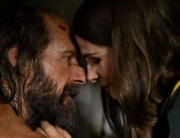This film is, at its heart, the tragic story of an adolescent genius undone by a dysfunctional home life, centering on a physics prodigy whose main obstacle is an ultra-controlling mother. She only wants the best for him, which, unfortunately, means significantly less time for girls and inline skating and more spent trying to win a coveted science contest. It is not difficult to sympathize with the main protagonist, who is a perpetually angry-faced teen known only as the Boy (Staszek Cywka). After all, what are mothers for, if not loving us unconditionally? But in the case of this mother, aka the Mother (Agnieszka Podsiadlik), love definitely comes with terms: namely, do what she says, and never take your eyes off the academic prize.
This feature-length battle of wills also explores the idea that we can severely damage those most dear to us through loving them too much. In the case of the Boy and the Mother, the latter moves them to a new city in an unfamiliar country, where the high schools are excellent, but the Boy is immediately alienated socially because he does not speak the language. That forces the two to become close. (Some might argue too close). However, for the youth, the entirety of Mother’s hopes and dreams is a lot to shoulder. At one point, sitting in a salon with her as she gets her hair done, he envisions himself as a Christ-like figure getting his feet washed by her, in the role of Mary Magdalene. It’s not so far from the truth.
From the beginning, the Boy has an active imagination, although his earliest fantasies tend toward the egocentric and sensationalistic. He starts to retreat further into his mind as real life becomes more stressful. The Boy fails in his initial experiments. Perhaps more heartbreaking is a birthday party, in which none of his classmates attend.
Amid all this personal and academic torment, his personal fantasy world starts to grow, populated by symbolism related to a regional myth of a forest spirit, the Erlking. On a visual level, these sequences make up some of the film’s most interesting, as the natural environment sharply contrasts the drab, inorganic cityscapes that define “reality.” But they’re also compelling because of the accompanying recitation, via voiceover, of an epic poem by Goethe, The Erkling, which hints at the Boy’s yearning for a father figure.
One eventually arrives in the form of the Man (Sebastian Lach), and from here on out there is a discernible shift in the familial dynamic. The Boy is no less arch and pouty, the Mother remains cool and aloof, yet with this third participant, who brings a warmer and more nurturing presence, the overall unit begins to approach an ideal balance. But it doesn’t last, and the third act brings renewed attempts at escape by the Boy, whose subsequent actions turn the narrative inside-out and essentially reset all the established rules.
Ultimately, The Erlprince might be a little too ambitious for its own good, but it’s built around something highly sensible: the need for love and the healing that comes with it. Some will find the ending overly bleak, but it can also be viewed as a clever inversion of the typical conclusion reached by most coming-of-age tales, in which one way or another, the protagonist makes peace with their past. (It’s not An Education by any means, but on the other hand, that film had far less fantasy elements and psychodrama.)
The Erlprince had its North American premiere at the Slamdance Film Festival and recently completed its run at the Berlin Film Festival.







Leave A Comment